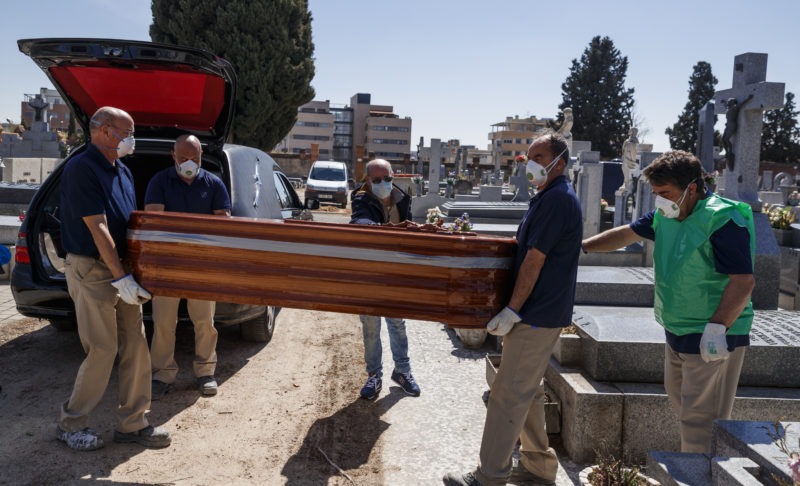Record virus deaths in Spain as world hunkers down
A burial in Spain, which along with Italy accounts for more than half of the world’s coronavirus deaths (BALDESCA SAMPER)
Madrid (AFP) – Spain broke another national record of daily coronavirus deaths Sunday as more than 40 percent of the world’s population was asked to stay at home to halt the deadly march of a disease that has claimed some 33,500 lives.
Hospitals are rapidly filling with a deluge of patients in Europe and the United States, now the focal points of a pandemic that began in Asia but is now upending the global economy and upsetting everyday life in unprecedented ways.
Spain announced 838 deaths in a 24-hour period, the third consecutive day it has seen a rise.
The United States has witnessed explosive growth in coronavirus cases, including a doubling in cases in only two days, with New York hardest hit.
Senior government scientist Anthony Fauci on Sunday issued a tentative prediction that COVID-19 could claim from 100,000 to 200,000 lives.
“This is the way pandemics work,” added Deborah Birx, who like Fauci is a member of the White House coronavirus task force, “and that’s why we all are deeply concerned.”
“No state, no metro area will be spared,” she told NBC.
A day earlier, President Donald Trump floated the idea of quarantining New York state and two neighbouring states, before dropping the idea just hours later in favour of a travel advisory.
That turnabout captured the confusion unfurling across much of the world.
As of Sunday, more than 3.38 billion people were asked or ordered to follow confinement measures, according to an AFP database, as the virus infects every sphere of life, wiping out millions of jobs, postponing elections and pressing pause on the sporting scene.
Worst-hit Italy, with 756 deaths in the past 24 hours, and Spain, with its 838, together have accounted for more than half of the world’s deaths.
Both countries are clinging to the hope, however, that they are closing in on the peak of the crisis.
– ‘We are on the verge’ –
As Trump continues to draw criticism for saying he hoped Americans would be back to work by Easter, other countries warned citizens that lockdowns will be the new normal for an indefinite period.
Spain is toughening already tight restrictions on movement while Italian authorities said they would extend a shutdown past an April 3 deadline.
“My ICU (intensive care unit) is completely full,” said Eduardo Fernandez, a nurse at Infanta Sofia hospital in Madrid, where authorities have set up a 5,500-bed field hospital and transformed an ice rink into a morgue.
“If it is not a complete collapse, we are on the verge,” he added.
The pandemic has spurred a worldwide scramble for medical gear as doctors and nurses struggle to dole out limited stocks of face masks and life-saving ventilators.
New York Mayor Bill de Blasio said his city, with more than 670 deaths so far, had enough protective gear only for another week.
“I have nothing for my head, nothing for my shoes,” said Diana Torres, who works in a rehabilitation centre in the city.
“Everybody is scared.”
– Long haul –
The US is now home to the highest number of confirmed COVID-19 infections globally with more than 135,000 cases, according to a Johns Hopkins University tally, which put worldwide deaths at 33,551.
The US death toll reached nearly 2,400 on Sunday, with cities like Detroit and New Orleans joining New York as hotspots.
As US states impose a patchwork of measures, Trump sowed confusion over the weekend by back-pedalling on his proposal to impose a broad lockdown on New York and its neighbours to prevent residents from virus-hit areas travelling to Florida and elsewhere.
He reversed course only hours after stunning the New York metropolitan region with his proposed “quarantine” — a measure Governor Andrew Cuomo dismissed as “preposterous.”
Across the Atlantic, Britain’s death toll passed 1,200 as Prime Minister Boris Johnson — who tested positive for the virus last week — warned that dark days lay ahead.
“We know things will get worse before they get better,” said Johnson, who reports only mild symptoms.
The country’s deputy chief medical officer warned that life would not return to normal for six months or more.
France deployed two specially equipped trains to transport coronavirus patients from overcrowded hospitals in the east to facilities along the western coast.
In hard-hit Iran, President Hassan Rouhani also said the country must prepare to adjust to “the new way of life” for the foreseeable future, after 123 more deaths were recorded.
The mayor of Moscow ordered self-isolation for all residents as Russia prepares to close its borders on Monday and take a week off work.
– Global divide –
More than 710,000 cases of the novel coronavirus have been officially declared around the world since the outbreak began late last year, according to the Johns Hopkins tally.
Variations in testing regimes mean the true number is likely far higher.
As health facilities in rich countries buckle under the pressure, aid groups warn of the toll for the millions in poor states and war zones such as Syria and Yemen.
Three billion people around the world lack access to running water and soap, the most basic weapons of protection against the virus, according to UN experts.
In Africa, Nigerian President Muhammadu Buhari ordered a two-week lockdown in Lagos and capital Abuja.
But in Benin, President Patrice Talon said his country could not enforce public confinement because it lacks the “means of rich countries”.
In China, however, life is creeping back to normal in the ground-zero city of Wuhan.
Officials say the biggest threat to public health is now imported cases.
“Initially we were more scared and maybe thought it was safer overseas,” said Han Li, who is helping floods of locals returning to Wuhan.
“But now it doesn’t seem this way. It seems it might be safer within China.”
burs-ssm/har/bbk/bgs
Disclaimer: Validity of the above story is for 7 Days from original date of publishing. Source: AFP.


